|
The volume 4, number 3,
edition of this column included references to souvenir shot glasses.
The volume 5, number 2, column featured an
Illinois ‘one hit wonder” glass.
In this issue I combine both themes by showcasing a
1904 souvenir glass that is the only glass from Mackinac Island,
Michigan. (The word is pronounced MACK-in-awe, not MACK-in-knack.) |
|
Somewhere
in Time
on
Mackinac Island |
|
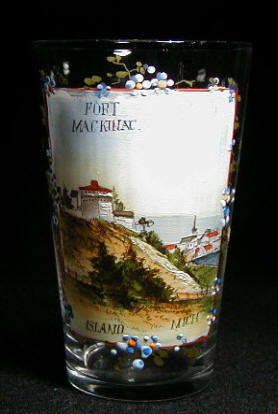 |
This glass is a
thin-walled highball. The text is in black on a hand-painted
enamel label that depicts a landscape scene with Fort
Mackinac on a hill. On the reverse side is engraved
“Regine/Sept 4,1904.”
Fort Mackinac is a limestone fort that
was constructed in 1780-81 on the bluffs of Mackinac Island.
This island is 3.776 square miles in land area and is in the
state of Michigan, in Lake Huron.
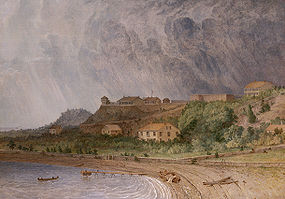 |
The British held
this fort throughout the Revolutionary War and used it to control the
strategic Straits of Mackinac between Lake Michigan and Lake Huron (thus
controlling the fur trade on the Great Lakes). The British did not turn
the fort over to the United States until 1796.During the War of 1812,
the fort became the scene of two strategic battles for control of the
Great Lakes. But after the war the fort gradually declined in military
significance. No longer needed as a front line border defense against
the British in Canada, the fort instead took on the roll of a military
holding camp. That is, troops not needed elsewhere were deployed to Fort
Mackinac and held in reserve. During the Civil War, the fort was used as
a prison for three Confederate political prisoners, guarded only by a
volunteer militia.
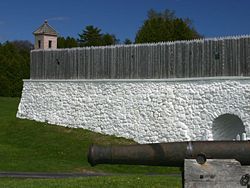 From
1875 to 1895, the fort and much of the island were part of the Mackinac
National Park, the second national park in the United States.
(Yellowstone National Park was the first.) However, the fort was still
used to house and train troops until 1895, when it was closed. The fort
then became part of Mackinac Island State Park, the first state park in
Michigan. From
1875 to 1895, the fort and much of the island were part of the Mackinac
National Park, the second national park in the United States.
(Yellowstone National Park was the first.) However, the fort was still
used to house and train troops until 1895, when it was closed. The fort
then became part of Mackinac Island State Park, the first state park in
Michigan.
A current
photograph of the fort is shown at right.
But Mackinac Island’s “claim to fame” is probably not Fort Mackinac.
Rather, it is probably better known for its large hotel, called
appropriately enough the Grand Hotel. This hotel was built in the late
19th century. Its front porch is purportedly the longest in the
world—six hundred feet in length.
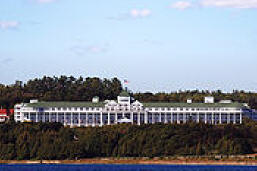 Shown
here is a photograph of the Grand Hotel. If you want a closer view, you
need only rent or buy the movie, Somewhere in Time, starring Christopher
Reeve, Jane Seymour, and Christopher Plummer. Shown
here is a photograph of the Grand Hotel. If you want a closer view, you
need only rent or buy the movie, Somewhere in Time, starring Christopher
Reeve, Jane Seymour, and Christopher Plummer.
This 1980 romance
was filmed on location at the Grand Hotel. Reeve plays Richard Collier,
a playwright. While staying at the hotel, he becomes infatuated by a
photograph of a young woman. Through self-hypnosis, he travels back in
time to the year 1912 to find true love with actress Elise McKenna
(portrayed by Seymour). Plummer plays her manager, who fears that
romance will derail her promising career and therefore vows to stop
Reeve at all costs. Every October the hotel hosts a convention for fans
of this now cult-classic romance movie.
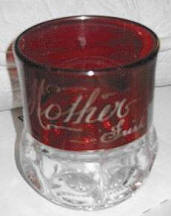 And
speaking of romance—what about “Regine,” the name of the woman engraved
on the glass? Souvenir glasses often featured the name of someone on
them. Consider, for example, this Chicago World’s Fair glass with the
name “Mother” on it. And
speaking of romance—what about “Regine,” the name of the woman engraved
on the glass? Souvenir glasses often featured the name of someone on
them. Consider, for example, this Chicago World’s Fair glass with the
name “Mother” on it.
Regine Olsen was a Danish woman who became engaged to the philosopher
and theologian Soren Kierkegaard in 1840. In 1841, though, Kierkegaard
broke off the engagement. He loved Regine, but he was unable to
reconcile the prospect of marriage with his vocation as a writer and his
passionate and introspective Christianity. Regine was heartbroken.
Kierkegaard would later beg Regine to forgive him for his actions.
This glass is dated September 4, 1904. Regine died on March 18, 1904.
Christopher Reeve traveled backward in time to follow his heart. Is it
possible that Regine traveled forward in time for the same reason? Did
Regine Olsen, like Christopher Reeve, eventually find romance on
Mackinac Island?

|


 From
1875 to 1895, the fort and much of the island were part of the Mackinac
National Park, the second national park in the United States.
(Yellowstone National Park was the first.) However, the fort was still
used to house and train troops until 1895, when it was closed. The fort
then became part of Mackinac Island State Park, the first state park in
Michigan.
From
1875 to 1895, the fort and much of the island were part of the Mackinac
National Park, the second national park in the United States.
(Yellowstone National Park was the first.) However, the fort was still
used to house and train troops until 1895, when it was closed. The fort
then became part of Mackinac Island State Park, the first state park in
Michigan. Shown
here is a photograph of the Grand Hotel. If you want a closer view, you
need only rent or buy the movie, Somewhere in Time, starring Christopher
Reeve, Jane Seymour, and Christopher Plummer.
Shown
here is a photograph of the Grand Hotel. If you want a closer view, you
need only rent or buy the movie, Somewhere in Time, starring Christopher
Reeve, Jane Seymour, and Christopher Plummer.  And
speaking of romance—what about “Regine,” the name of the woman engraved
on the glass? Souvenir glasses often featured the name of someone on
them. Consider, for example, this Chicago World’s Fair glass with the
name “Mother” on it.
And
speaking of romance—what about “Regine,” the name of the woman engraved
on the glass? Souvenir glasses often featured the name of someone on
them. Consider, for example, this Chicago World’s Fair glass with the
name “Mother” on it.